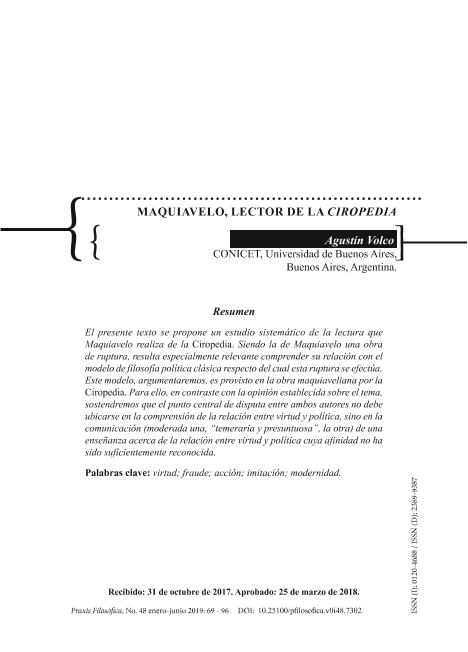Artículo
El presente texto se propone un estudio sistemático de la lectura que Maquiavelo realiza de la Ciropedia. Siendo la de Maquiavelo una obra de ruptura, resulta especialmente relevante comprender su relación con el modelo de filosofía política clásica respecto del cual esta ruptura se efectúa. Este modelo, argumentaremos, es provisto en la obra maquiaveliana por la Ciropedia. Para ello, en contraste con la opinión establecida sobre el tema, sostendremos que el punto central de disputa entre ambos autores no debe ubicarse en la comprensión de la relación entre virtud y política, sino en la comunicación (moderada una, “temeraria y presuntuosa”, la otra) de una enseñanza acerca de la relación entre virtud y política cuya afinidad no ha sido suficientemente reconocida. This paper presents a systematic study of Machiavelli’s reading of the Cyropaedia. Being Machiavelli’s work a “depart[ure] from the orders of others”, it’s particularly important, we will argue, to understand the relation with the model of classical political philosophy that is attacked in his own books. This model is provided, we will claim, by the Cyropaedia. To carry out this task, and in contrast with the established opinion on the subject, we will argue that the fundamental dispute among our two authors does not lie in the understanding of the relation between politics and virtue, but in the communication of a teaching regarding this relation (moderate in one case, “presumptuous” in the other) whose affinity has not been sufficiently recognized.
Maquiavelo: lector de la Ciropedia
Título:
Machiavelli: Reader of the Cyropaedia
Fecha de publicación:
06/2019
Editorial:
Universidad del Valle
Revista:
Praxis Filosófica
ISSN:
0120-4688
e-ISSN:
2389-9387
Idioma:
Español
Tipo de recurso:
Artículo publicado
Clasificación temática:
Resumen
Archivos asociados
Licencia
Identificadores
Colecciones
Articulos(SEDE CENTRAL)
Articulos de SEDE CENTRAL
Articulos de SEDE CENTRAL
Citación
Volco, Agustin; Maquiavelo: lector de la Ciropedia; Universidad del Valle; Praxis Filosófica; 48; 6-2019; 69-96
Compartir
Altmétricas




